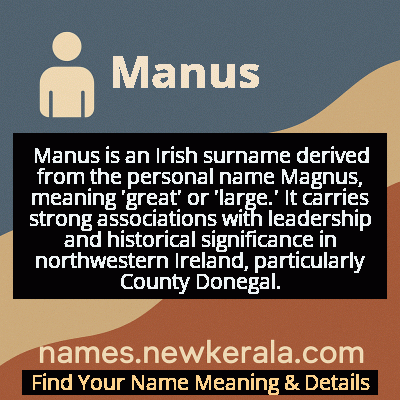Manus Name Meaning & Details
Origin, Popularity, Numerology Analysis & Name Meaning of Manus
Discover the origin, meaning, and cultural significance of the name MANUS. Delve into its historical roots and explore the lasting impact it has had on communities and traditions.
Name
Manus
Gender
Male
Origin
Irish
Lucky Number
5
Meaning of the Name - Manus
Manus is an Irish surname derived from the personal name Magnus, meaning 'great' or 'large.' It carries strong associations with leadership and historical significance in northwestern Ireland, particularly County Donegal.
Manus - Complete Numerology Analysis
Your Numerology Number
Based on Pythagorean Numerology System
Ruling Planet
Mercury
Positive Nature
Adventurous, dynamic, curious, and social.
Negative Traits
Restless, impatient, inconsistent, prone to indulgence.
Lucky Colours
Green, white.
Lucky Days
Wednesday.
Lucky Stones
Emerald.
Harmony Numbers
1, 3, 9.
Best Suited Professions
Sales, marketing, travel, entertainment.
What People Like About You
Versatility, charisma, adventurous spirit.
Famous People Named Manus
Manus O'Donnell
Irish Chieftain and Writer
Authored 'The Life of Colum Cille' and led the O'Donnell clan in 16th century Ulster
Manus McFadden
Gaelic Footballer
Donegal football legend who won multiple county championships
Manus Kelly
Rally Driver and Politician
Three-time Donegal International Rally winner and local councillor
Manus O'Cahan
Military Commander
Prominent Irish cavalry leader during the Confederate Wars
Name Variations & International Equivalents
Click on blue names to explore their detailed meanings. Gray names with will be available soon.
Cultural & Historical Significance
The name's distribution remains concentrated in County Donegal and surrounding areas, reflecting its deep regional roots. Throughout Irish history, bearers of the Manus surname have been prominent in various aspects of Gaelic society, from military leadership to cultural stewardship. The surname embodies the resilience of Irish identity through centuries of change, serving as a living connection to the Gaelic aristocracy and their efforts to maintain cultural autonomy. Its continued presence in modern Ireland, particularly in its traditional heartland, demonstrates the enduring nature of regional identities and family lineages in Irish society.
Extended Personality Analysis
Individuals with the surname Manus are often characterized by strong leadership qualities, resilience, and a deep sense of cultural identity. These traits reflect the historical context of the name, which is associated with Gaelic chieftains and community leaders who navigated complex political landscapes. There is typically a strong sense of determination and practicality, combined with loyalty to family and community that has been passed down through generations. Many bearers of the name demonstrate a protective instinct toward their heritage and traditions, often serving as custodians of family history and cultural knowledge.
The historical association with the O'Donnell clan and other prominent Gaelic families often translates into modern personality traits including natural authority, strategic thinking, and the ability to inspire confidence in others. There is frequently a creative or artistic dimension to their character, reflecting the cultural contributions of historical namesakes like Manus O'Donnell. The combination of practical wisdom and cultural sensitivity makes individuals with this surname often effective in roles that require balancing tradition with innovation. Their strong regional identity typically manifests as pride in their specific heritage rather than generalized Irishness, reflecting the particular historical significance of the name in northwestern Ireland.
Modern Usage & Popularity
In contemporary usage, the surname Manus maintains its strongest presence in Ireland, particularly in its traditional heartland of County Donegal and the wider Ulster province. While not among the most common Irish surnames, it has stable representation in both Ireland and diaspora communities, especially in the United States, Canada, and Australia where Irish immigrants settled. The name has experienced some decline due to emigration patterns but continues to be preserved through family lineages. Recent decades have seen increased interest in genealogy and cultural heritage, leading to renewed appreciation for distinctive regional surnames like Manus. Modern bearers often maintain strong connections to their specific regional origins, with many actively researching and preserving their family history. The surname appears in various professional fields while maintaining its association with Irish cultural organizations and community leadership roles.
Symbolic & Spiritual Meanings
The surname Manus carries rich symbolic meaning as a representation of cultural endurance and the fusion of different historical influences in Ireland. It symbolizes the resilience of Gaelic identity through centuries of political and social change, serving as a living connection to Ireland's medieval aristocracy. The name embodies the historical integration of Norse and Gaelic cultures, representing Ireland's complex relationship with broader European influences while maintaining distinct regional character. Symbolically, it stands for leadership and authority rooted in cultural legitimacy rather than imposed power, reflecting the traditional Gaelic social structure. The name also represents regional pride and specific geographical identity, particularly the distinctive culture of northwestern Ireland. As a symbol, it conveys the importance of cultural preservation, the value of historical continuity, and the strength derived from understanding one's place in a long historical narrative.

